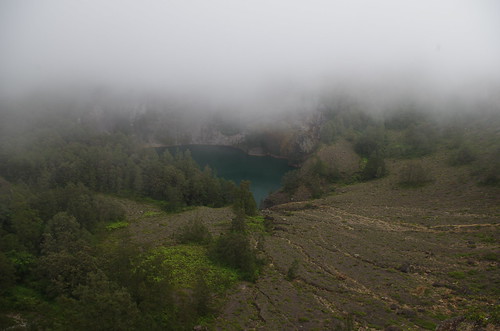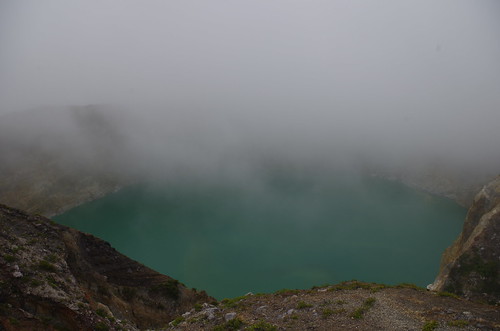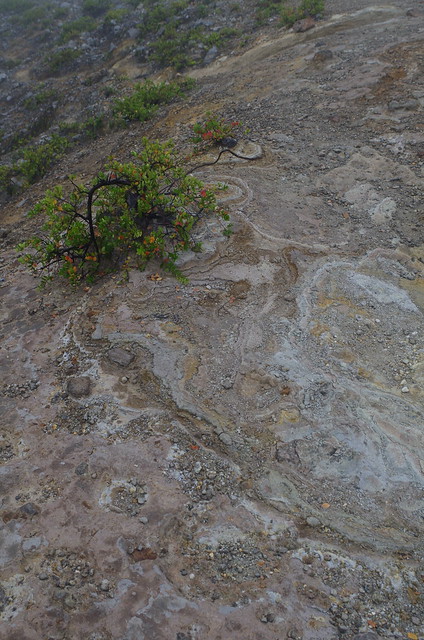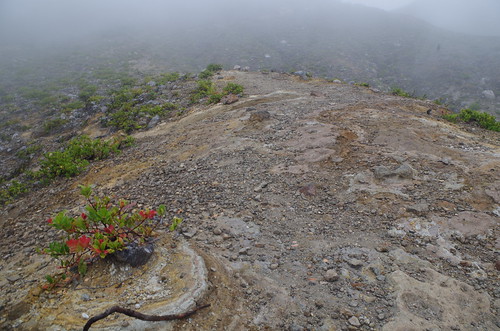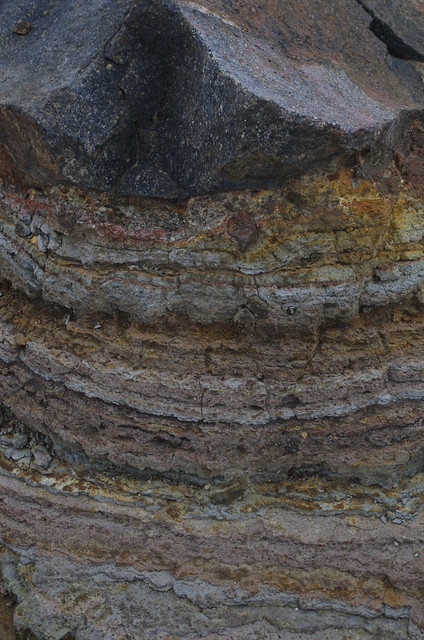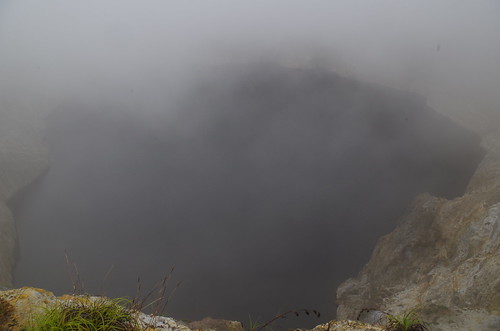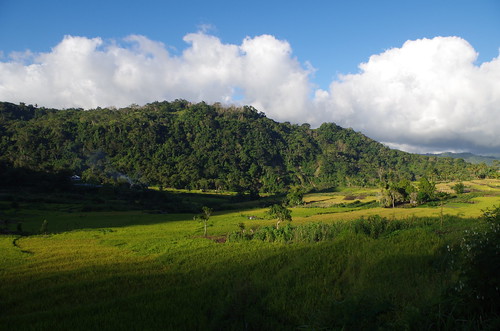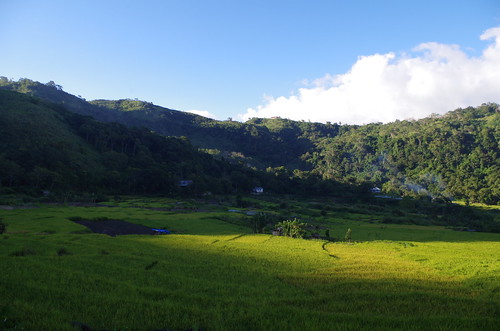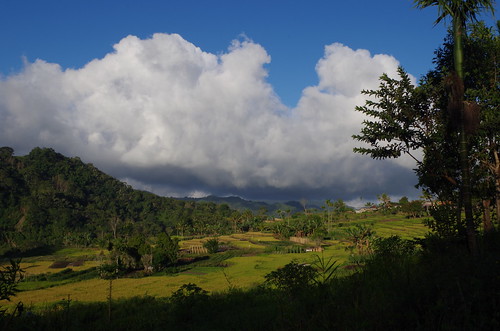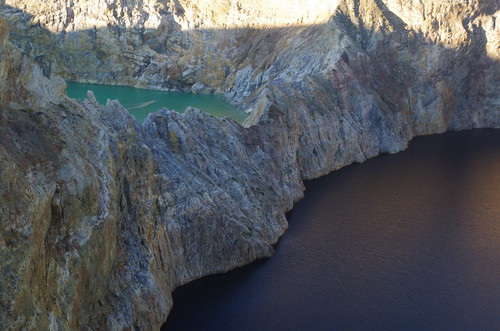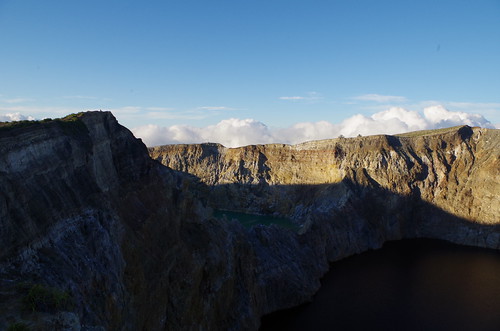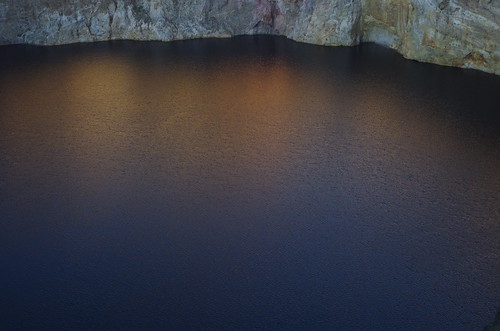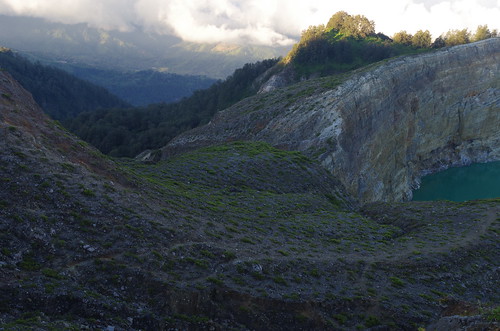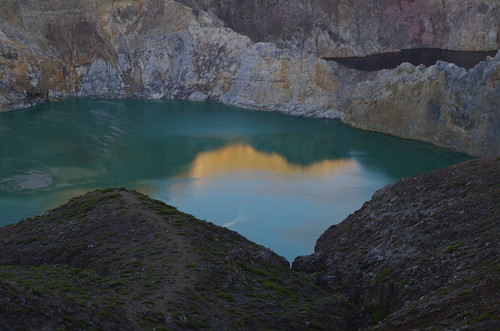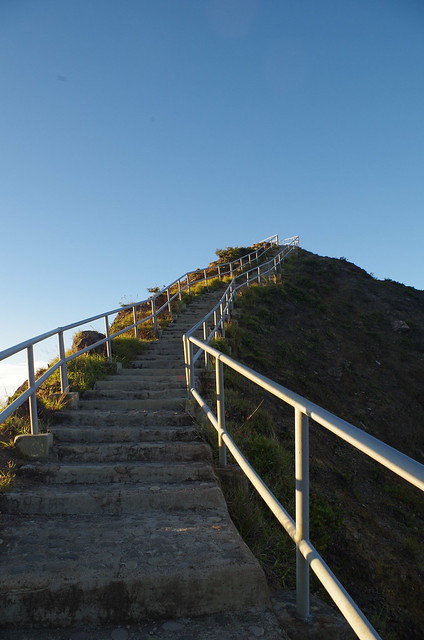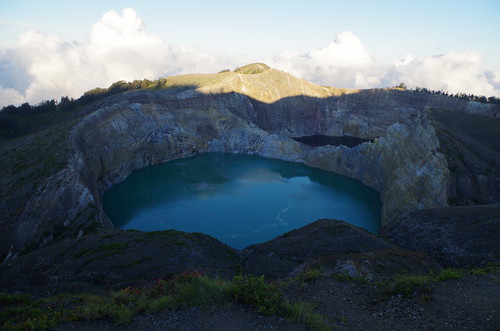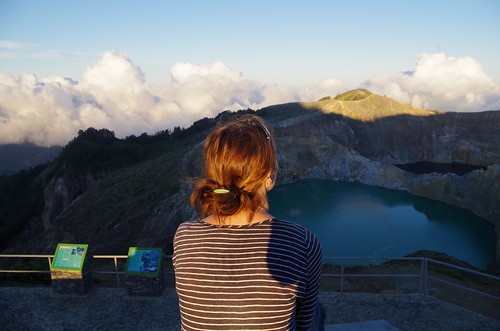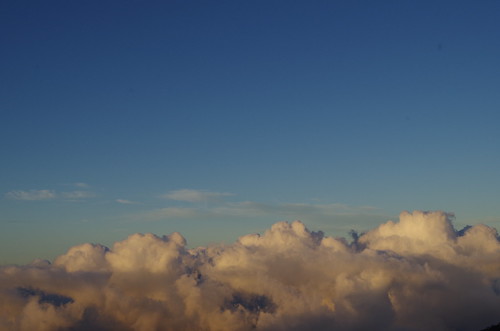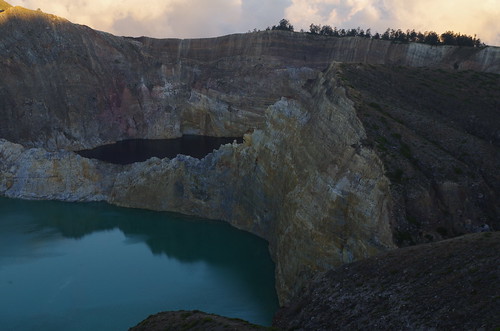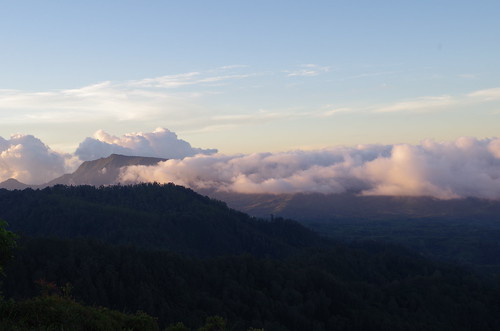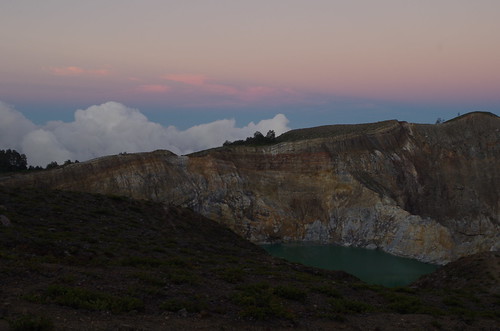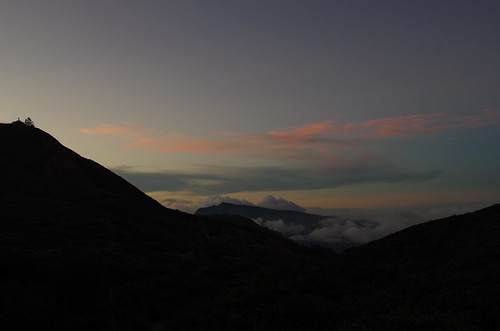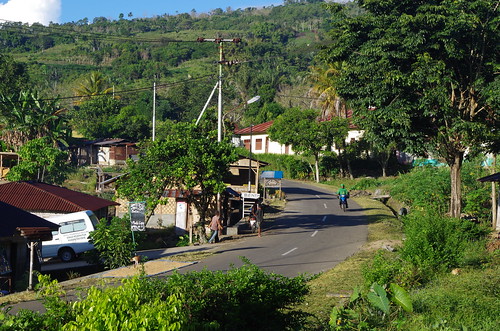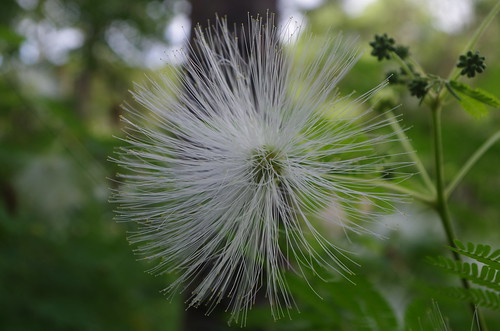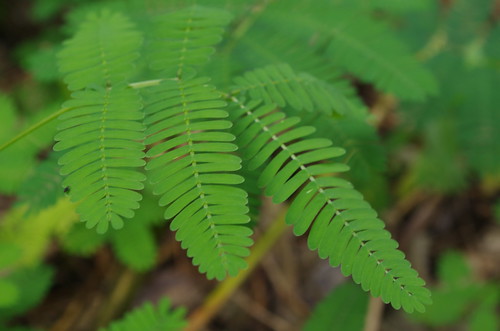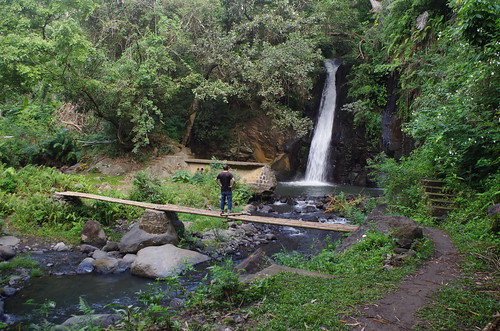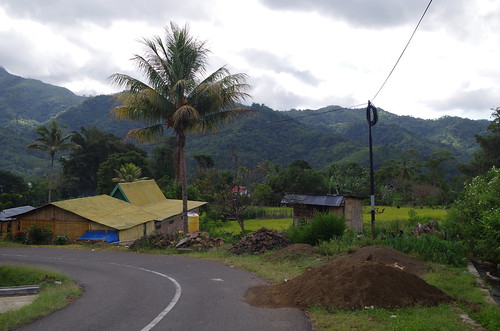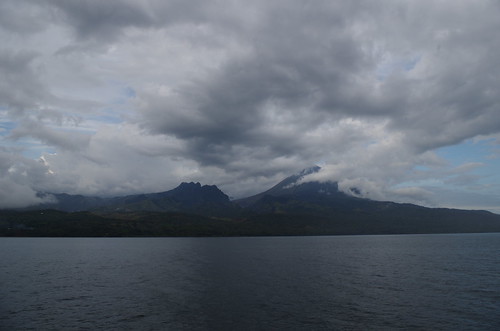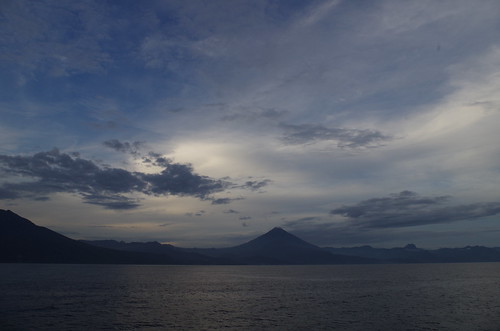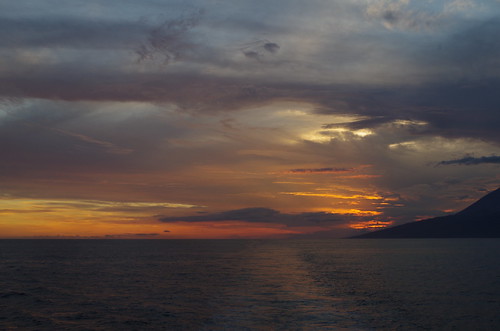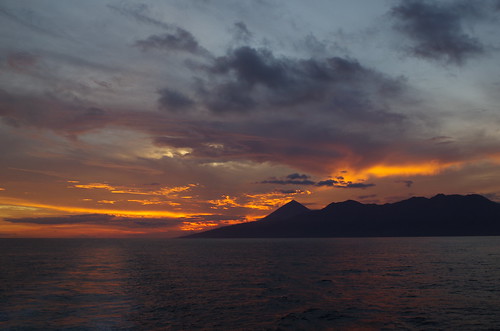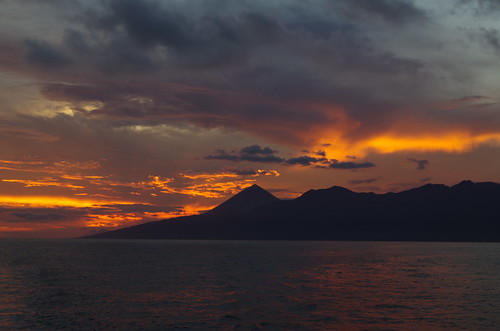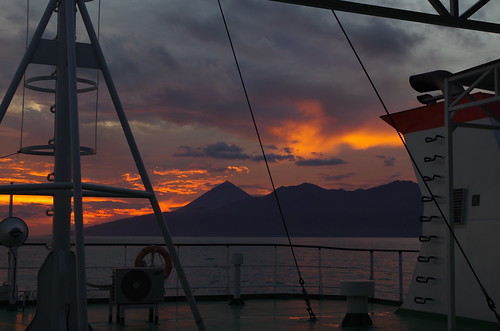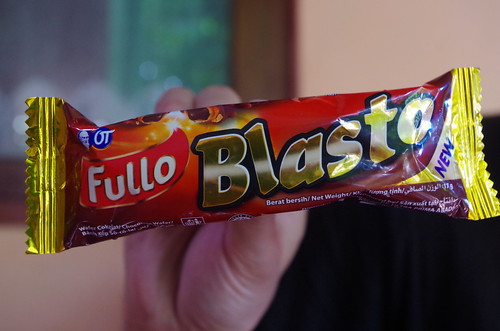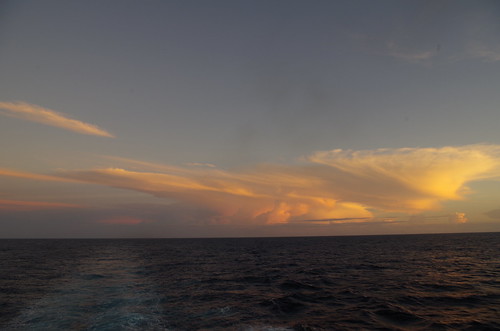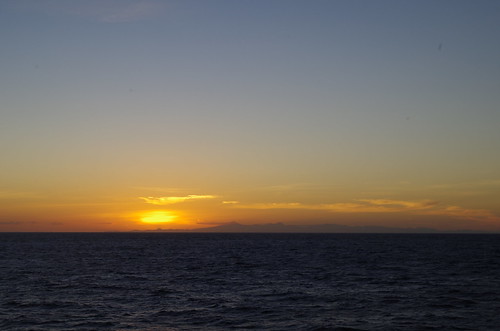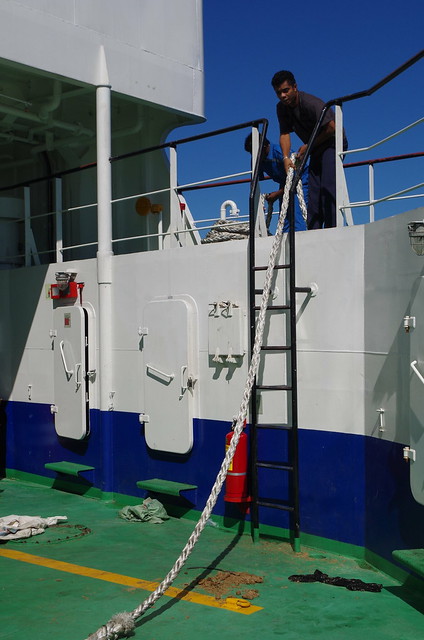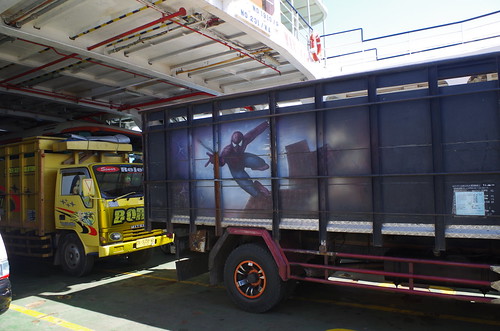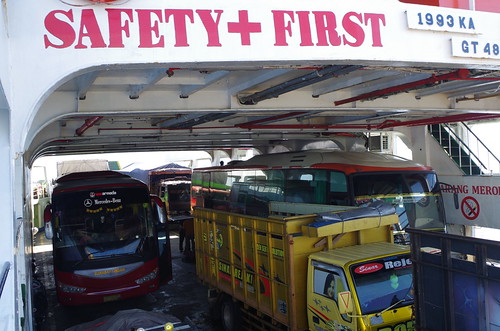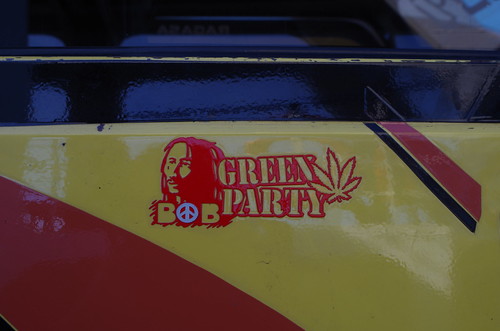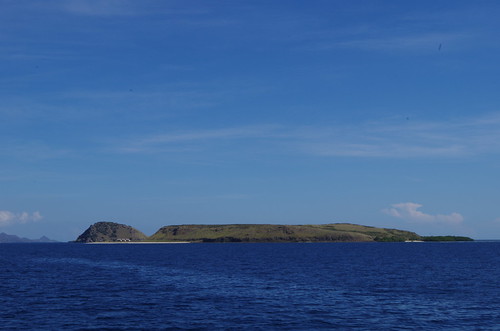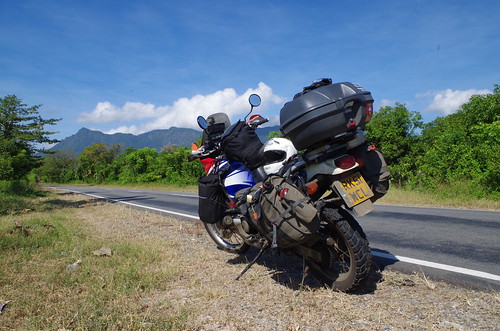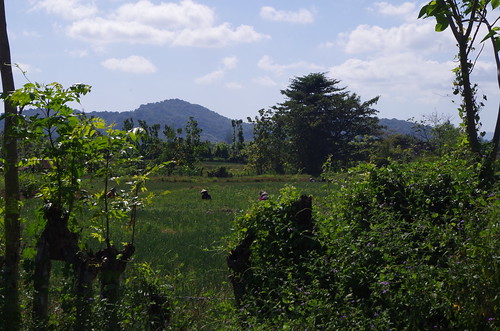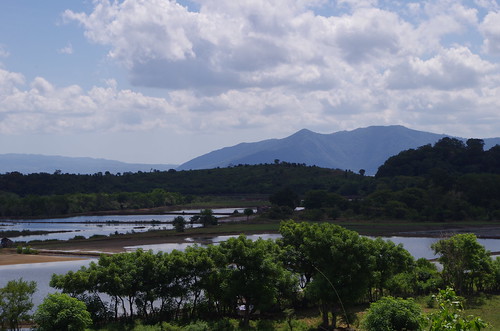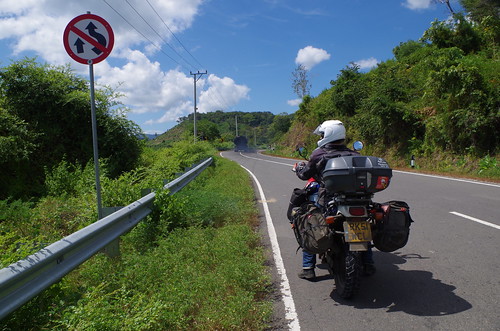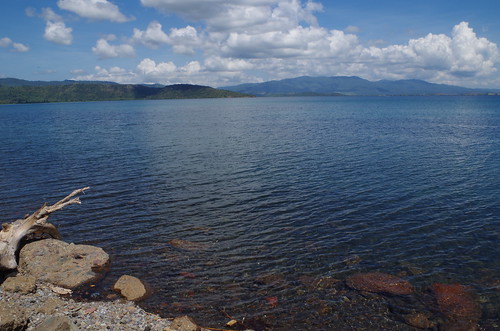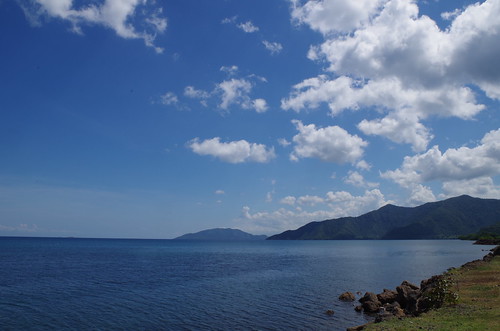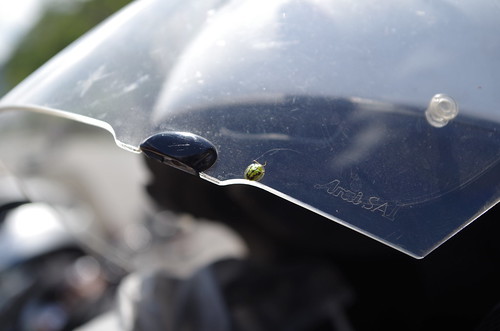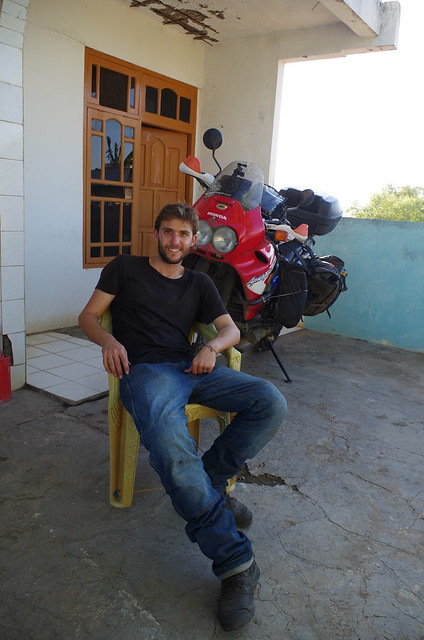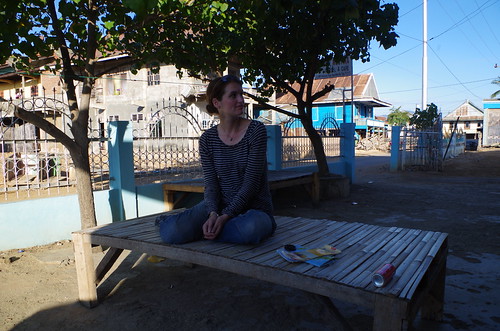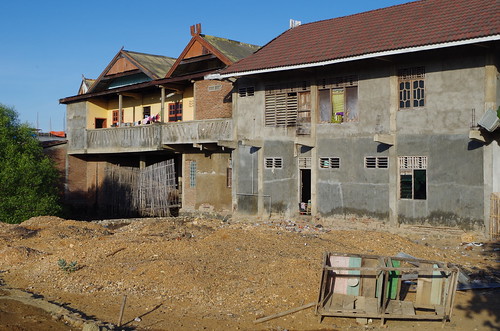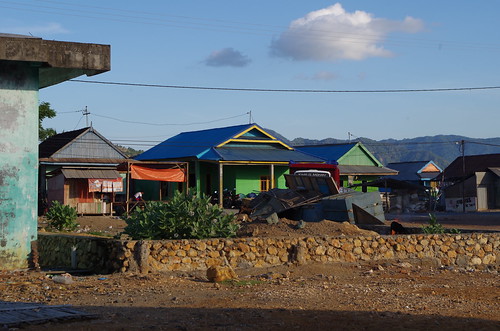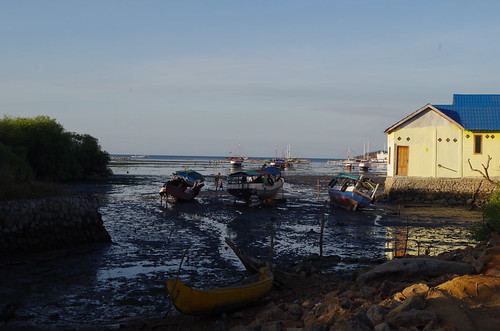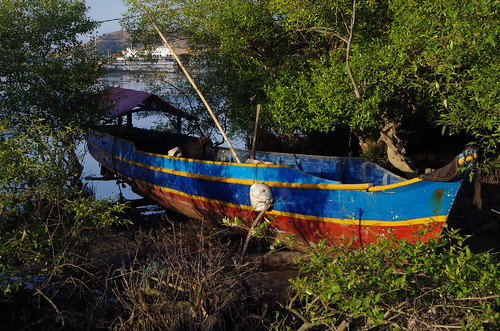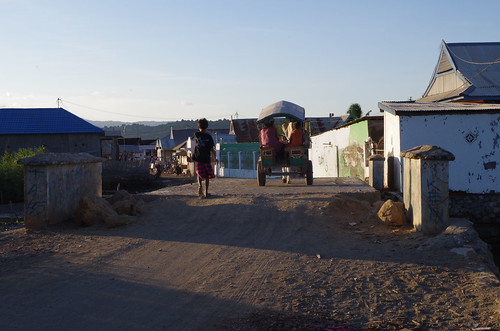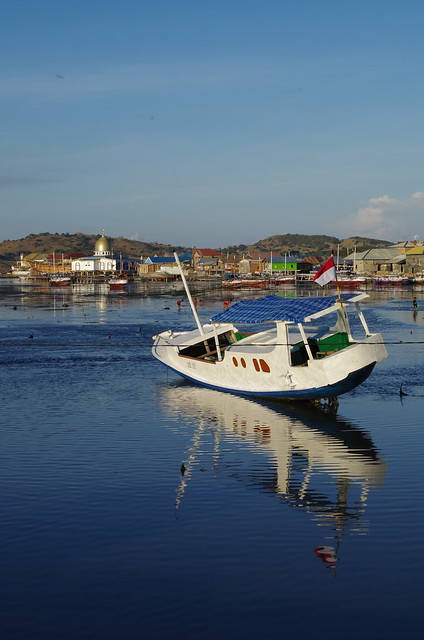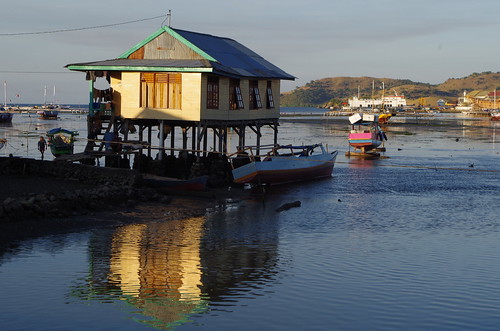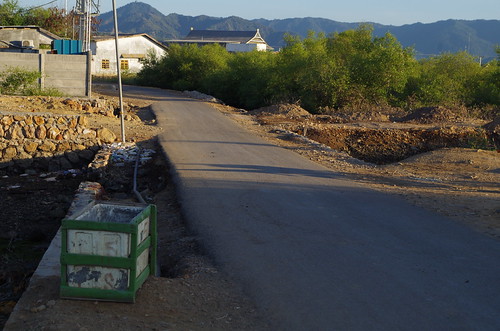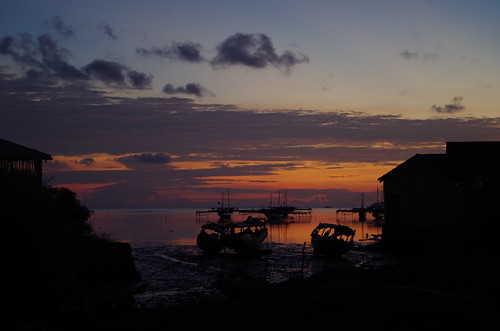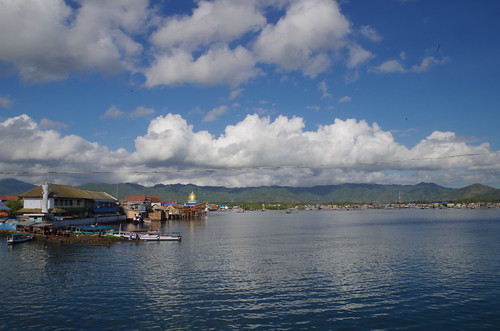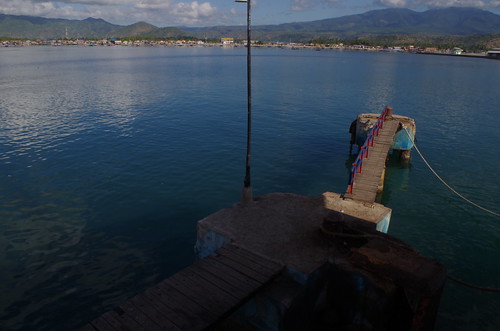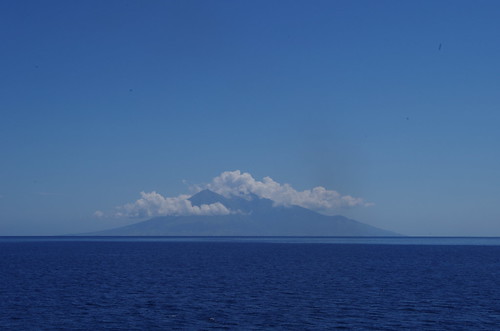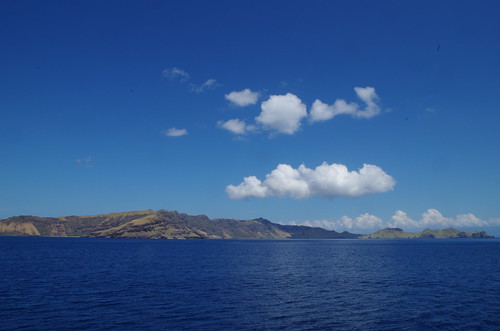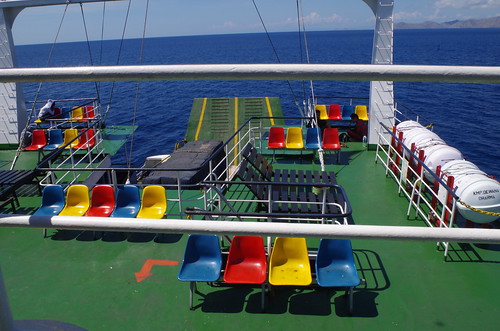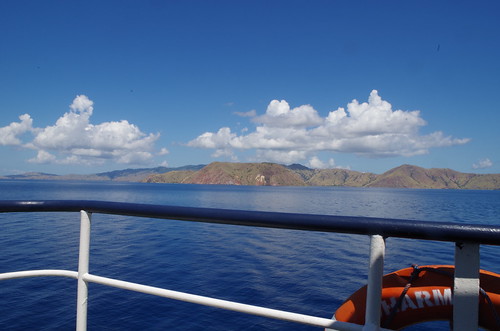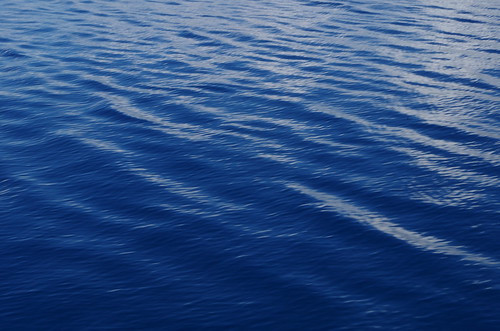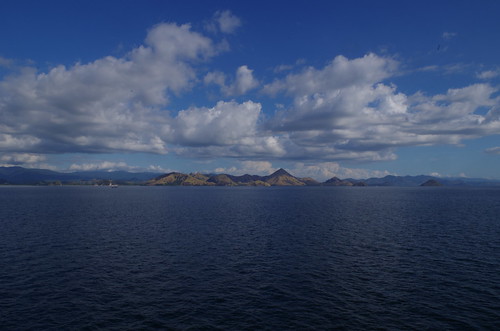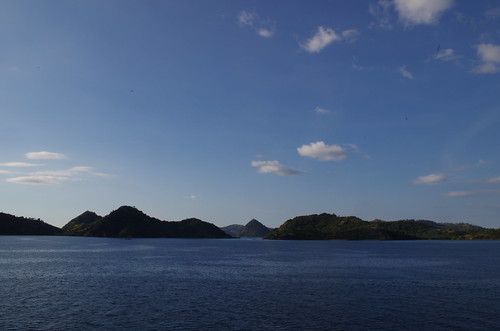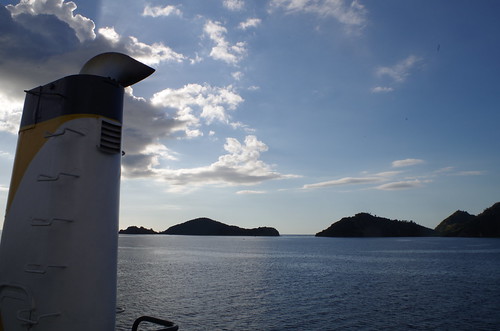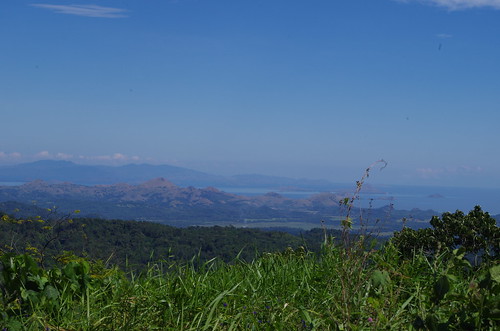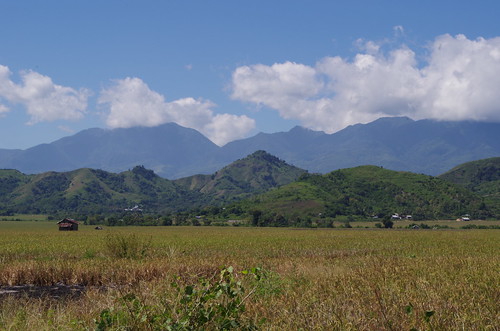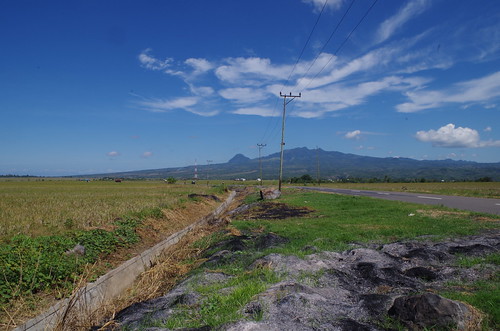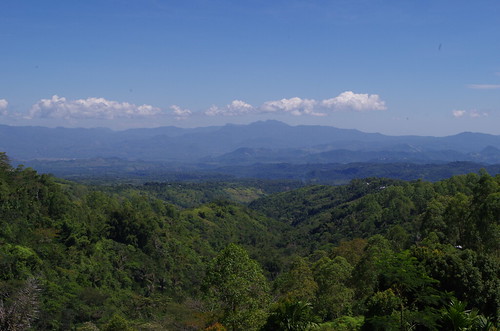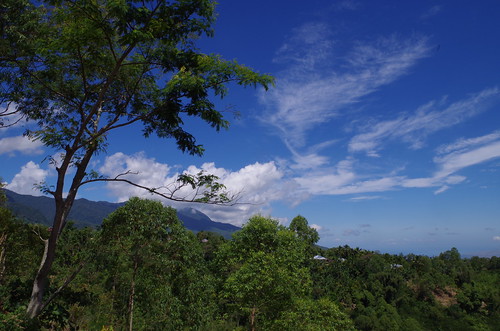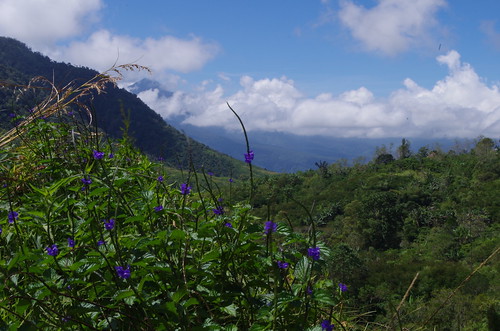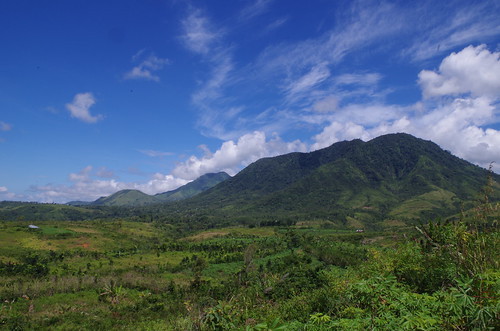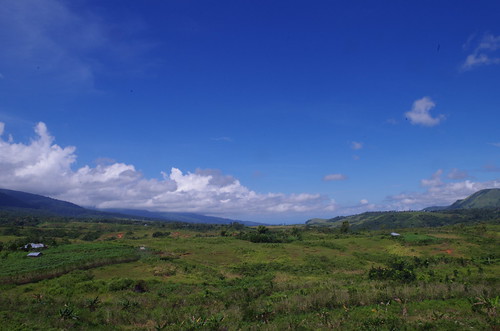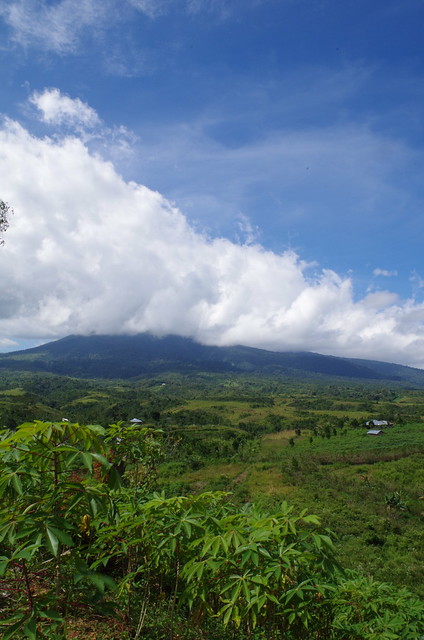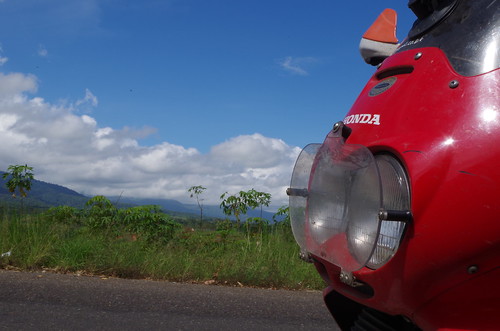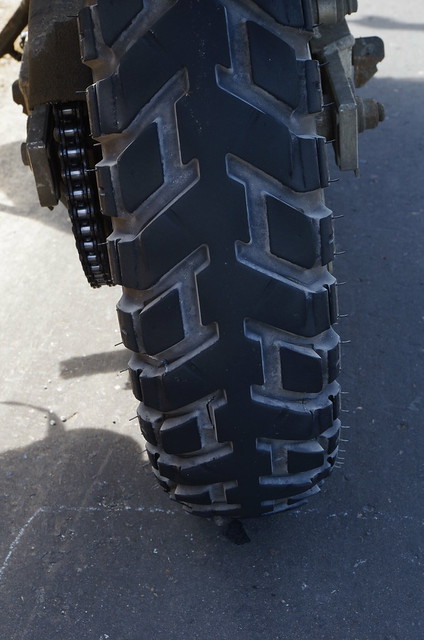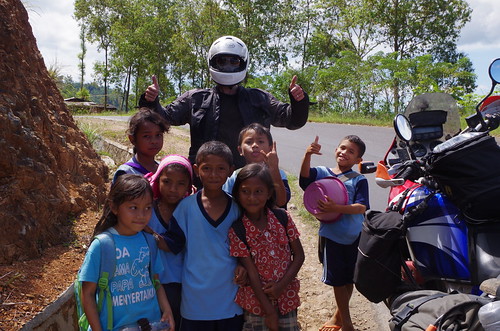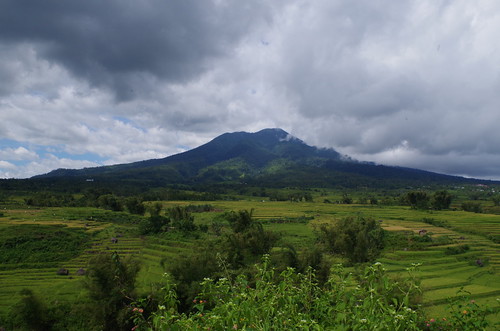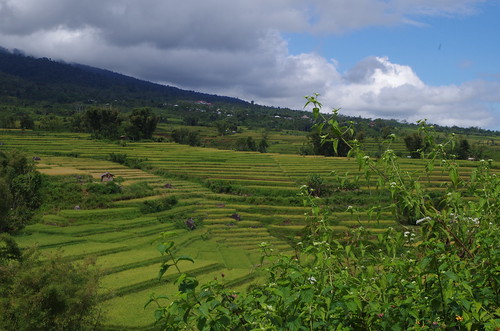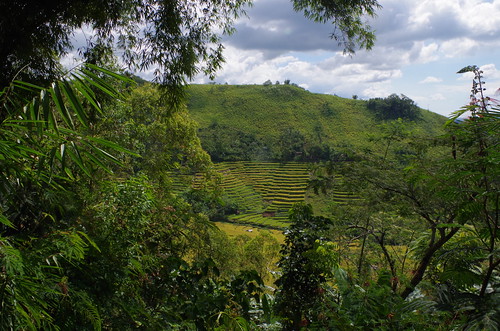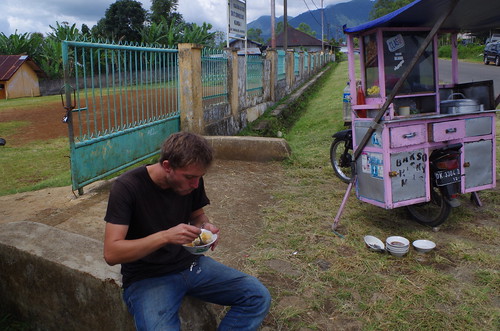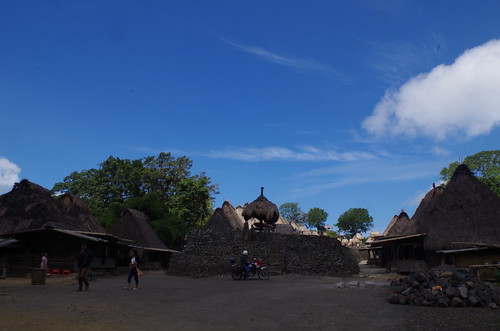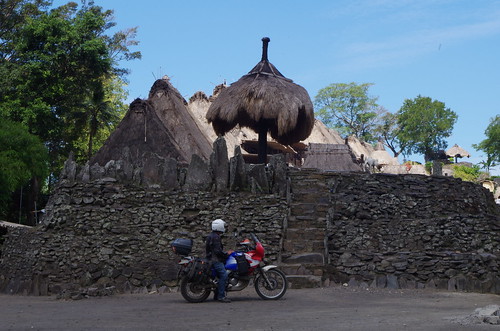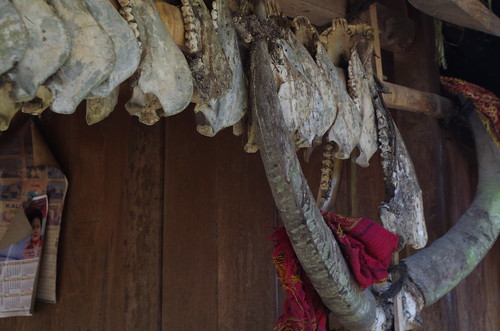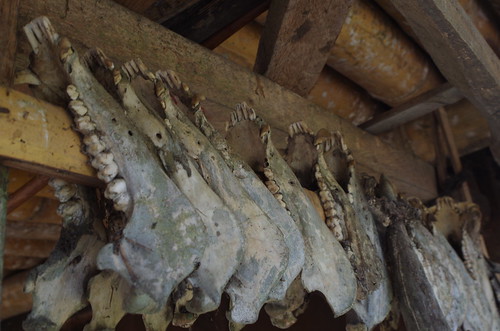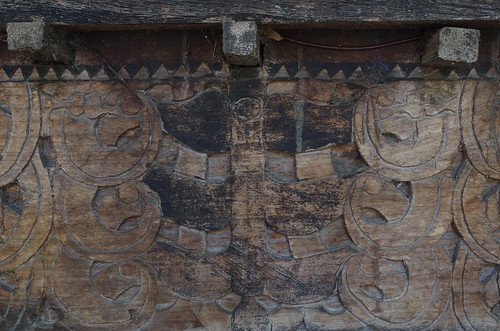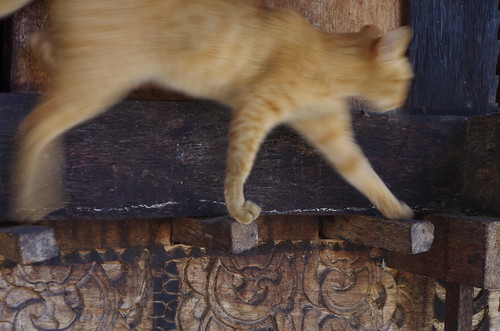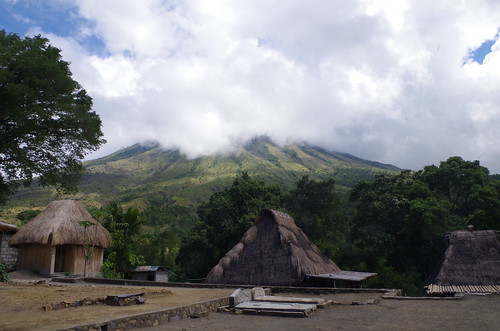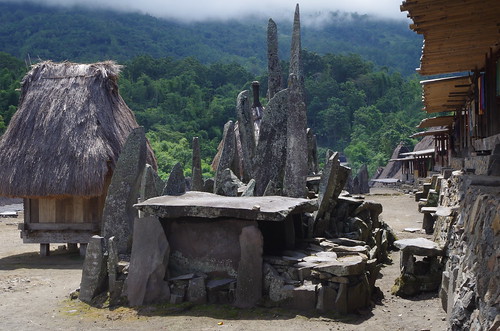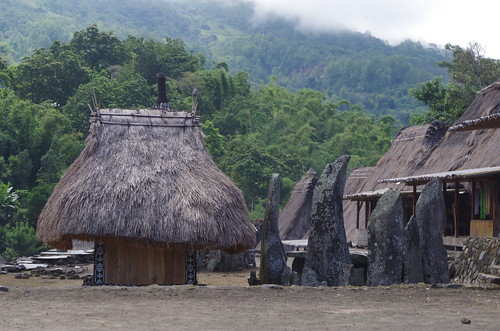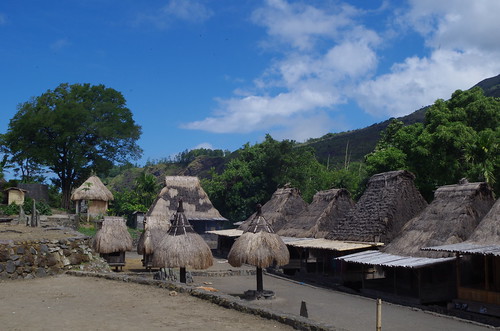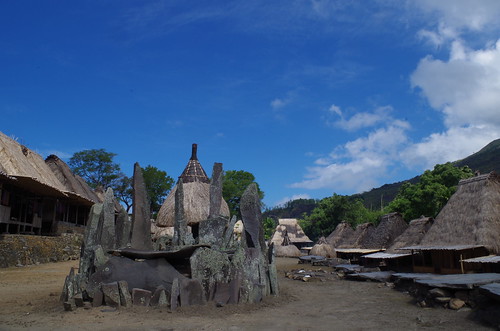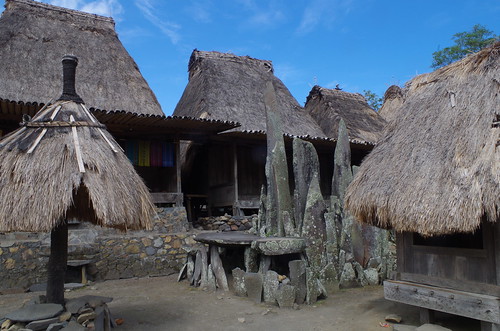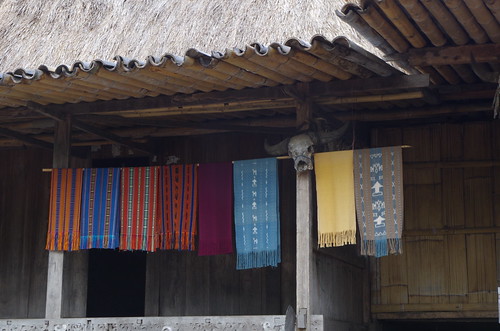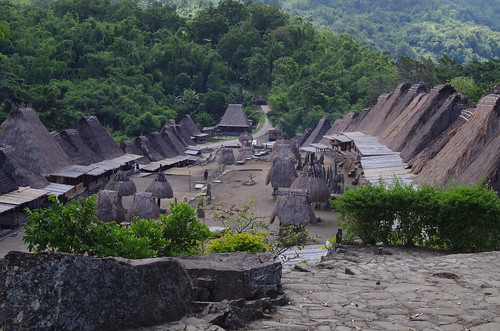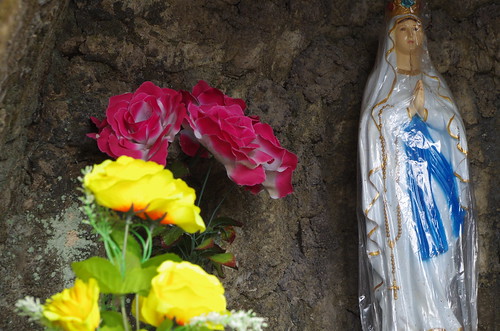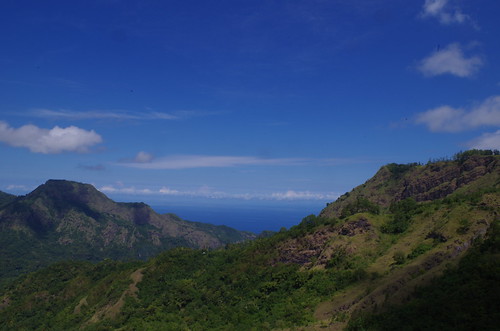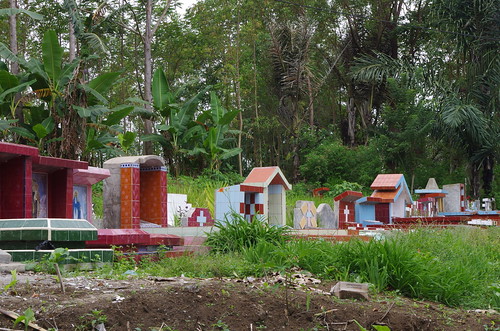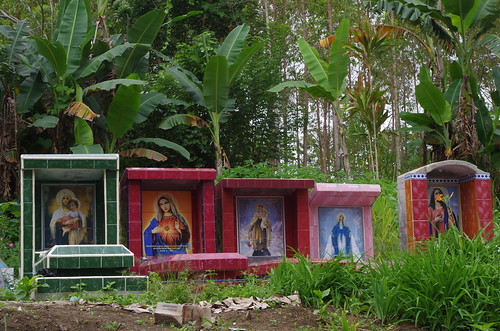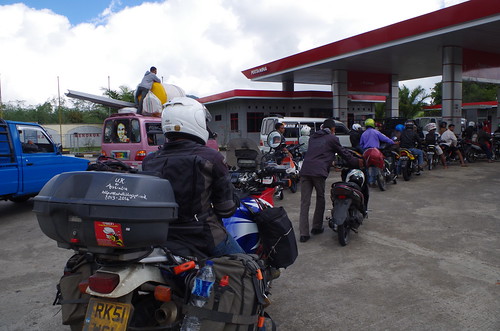After our final awesome breakfast at Happy Happy, we got on the road and on our way. The plan was to get to the famous Kelimutu, swinging by the town of Ende on the way to enquire about ferries to Timor. As we had come to expect from Flores, the drive served up some incredible scenery, combined with twisty spaghetti roads. Whilst we quite enjoy the corners, they are evidently not to everyone's taste. As we followed a pick-up full of people, one poor man leaned out of the back and vomited spectacularly. It really was quite impressive, albeit not something we felt the need to look at too closely. Oli braked sharply, then overtook as soon as the opportunity presented itself.
The mountain road eventually hit the coast, skirting around the cliff edge, and swooping up and down past picture-perfect ocean views. The sea was a vibrant turquoise, its colour enhanced by the black sand of the beach. Some of the beaches were pebble rather than sand, the stones an unusual colour, almost a duck-egg blue/green. Sadly their unique shape and hue makes them a desirable commodity, and they are much in demand. The local villagers were collecting huge sacks of them. The scale of the removal was terrible, and it seemed quite possible that the pebble beaches will soon be gone forever. To make things worse, people were still living in poverty, so they do not seem to be benefiting from the destruction. Probably a middle-man buys the goods for a pittance, and is selling them on for a huge profit.
Our coastal drive brought us into Ende. We had heard that ferries departed from here to Timor, but had not been able to find out the day. We assumed it would be a simple case of asking around, as surely somebody would know. Unfortunately however, I don't think it is an exaggeration to say that nobody had the slightest of clues. Annoyingly nobody actually admits that they don't know, and instead just makes up a day. In the course of asking around we ended up with confident answers covering every day of the week, at varying times and even from varying locations. Even the police officer manning the empty port didn't know, but guessed Saturday.
After an hour of fruitless questioning we were no further forward than when we had arrived, although we had seen the coast again. Somebody had said the boat to Kupang usually went from Nga Keo port, ten miles back down the road. Nobody knew anything about it there either. Slightly frustrated, we decided to abandon the mission and work out our options later.
Moni village was not far away, and we were keen to get there and kick back. Of course it was not that simple, and just a few kilometres out of Ende we encountered a road block. The cause of this was some pretty hefty roadworks, which seemed to be aiming at widening the narrow mountain route. With not many roads there was no chance of a detour, so we joined the gang of scooters and lorries steadily building up. After about half an hour they let the bikes go, which involved a rather exciting element as we had to tightly squeeze between a digger and a cliff edge. Happily, the rest of the drive was far easier, the only thrill being the gorgeous mountain scenery on the way.
Flores accommodation so far had been relatively expensive for what is on offer, so our expectations were fairly low. However, we were pleasantly surprised to find that the first place we asked at was clean, decent and within our ideal budget. The price even included hot water, a luxury for us these days. Also staying there were a Dutch couple. It was the lady's birthday, so we all celebrated with a dinner at the fanciest restaurant in town (all things being relative). The food was decent, very local fare. A nice change from the usual offering of rice and noodles.
We arrived back at our guest house to find that the owner had decided to throw a party by way of birthday celebrations. In all honesty I think it was mostly an excuse to have his mates round for an arak (local, home made palm spirit) drinking session. We hung around for a while enjoying the guitar playing and singing of one of the guys, but after a while left them to it. We had been told that the best time to see Kelimutu was sunrise, so tucked in to bed and hoped the early start would be worth it.
Kelimutu is perhaps the best known attraction on Flores island. At the peak of the mountain are three volcanic lakes. What makes them special is the fact that they regularly change in colour, with turquoise, green, chocolate and red all being reported over the years. At the time of our visit one was aqua, one chocolate, and one dark green. However, just two months before our visit the chocolate one had been turquoise in colour. Nobody is entirely sure on the reasons for the colour shifts, but it is widely hypothesised to be related to changing mineral contents in the water.
Oli and I usually avoid sunrise excursions, but after the experience of Bromo we had started to reconsider this stance. We were up accordingly at 4:30, riding the bike up a steep, winding mountain to get to the national park gate. I went in to buy our tickets, and was disappointed to find that not only were tickets considerably more expensive for foreigners, but that there was also a fee for taking in a camera. The camera fee itself cost more than both our tickets together, and was also ten times more expensive for us than if an Indonesian person had wished to bring in theirs. I complained politely to the ticket attendant, who just looked uncomfortable and giggled in response. Dual pricing has been my pet hate of travelling, and has been an issue in almost every country since Turkey. I just don't think it is a very nice way to treat visitors.
We parked up the bike and began the short climb up to the lakes. In the dark we could see that it was a little misty, but we hoped that it would begin to clear as the sun rose. Sadly, it did not. If anything, it got worse. We climbed all the way to the top and stood despairingly as the cloud swirled around us. Sunrise was non existent, just a gradual realisation that it was no longer dark. At one point the mist cleared slightly for about ten seconds, affording us a tiny glimpse of the vibrantly coloured aqua lake. Gradually the other tourists peeled away and went home, leaving just us and three other visitors. We got chatting to one of them, who was an Indonesian traveller and blogger from Java. He was a lovely guy, and told us that this was his third attempt at seeing the lakes, with each visit being thwarted by the weather. Eventually he decided to leave also, so we wished him luck for next time.
We sat it out for a little while longer, before also deciding that conditions were unlikely to improve. On the way back down we walked to the edge of the turquoise lake to see if we could get a closer look, but again only got a tiny glimpse when the mist gave us a few seconds grace. Wanting to try and get our moneys worth from the camera fee, we instead consoled ourselves with looking at the interesting patterns and colours in the rocks around us. All in all it had been a bit of a disappointing visit, especially considering that it had been a significant detour for us. We walked back to the bike, feeling slightly dejected. To make things even better, it rained on us all the way back down the mountain, making the road treacherous and slippy. We couldn't even photograph the beautiful rice paddies, as the camera lens kept steaming up.
Back in Moni, we were looking forward to a relaxing day, planning to just sit on the porch and watch village life trundle by. After doing this for most of the day we went for a nap, then awoke to bright sunshine. As we looked up at the hills it seemed that conditions were clear. With nothing to lose we thought we might as well try again, so hurriedly put on our bike gear and scrambled up the mountain in the fading afternoon light.
When we arrived at the park gate, the ticket officer wanted us to pay again. This seemed decidedly unfair to us, seeing as our morning views had consisted of bugger all. Luckily I am not too dignified to beg, and just pleaded desperately until the lady wavered and allowed us through. At this we switched to thanking her profusely, then carried on for the last few kilometres to the car park. We marched up to the lakes as quickly as possible, huffing and puffing due to our questionable fitness. There wasn't much light left in the day, and we very much wanted to make the most of it.
It was well worth the effort. In the clear light of the evening we were in a completely different world, nothing like the foggy soup of the morning. The landscape was revealed as an epic and rocky expanse, the lakes themselves sitting brightly within. The colours of the aqua and chocolate lakes were enhanced beautifully by the evening sun, and the views from the top were fantastic. We sat for a while drinking it all in, very glad that we had given it another chance.
The light was fading fast, and if at all possible we wanted to get down the harder part of the road before the dark set in. Oli however decided he couldn't resist trying to chuck some stones into the lakes, so instead we spent the last rays of sunlight doing this. The walls of the lakes are a lot higher than they appear from the top, as the stones fell for a long time before making any noise. We got back to the bike just as night fell, working our way back down the hair-pin bends of the road. With almost no light pollution the stars were beautiful. We paused on the side of the road to better admire them, thousands of twinkling lights against a jet-black sky.
We rather liked Moni village, so the next morning were toying with staying an extra day. A lot of asking around had confirmed that there should be a ferry to Kupang from Aimere on Saturday, so we had a day to kill either in Moni or back in Bajawa. The peaceful atmosphere of the village was definitely tempting us to stay, but after a little deliberation we decided it was more practical to go back to Bajawa for a night.
The included breakfast at our hotel was tasty but small, so we greedily decided to go out for a second. Opposite the restaurant we saw a couple of cars stop, with tourists getting out, disappearing along a path for a while, then coming back. Thinking there must be something worth seeing down there, we thought we might as well take a detour before walking home.
As we started to descend the footpath, we were met by three elderly ladies, their teeth stained red by chewing betel nuts. We greeted each other and walked on, Oli and I noticing that each of them was carrying an enormous machete. Carrying knives has been fairly common throughout rural Indonesia, but especially so in Flores. Even young children can often be seen casually wandering around with eighteen inch blades either in their hands or strapped to their belts. Of course here they are used for practical purposes, but we could easily imagine the national crisis and Daily Mail headlines if the same situation was to be transplanted to England.
It turned out that the footpath led to a waterfall, set prettily within the woodland. In front of it was a slightly precarious looking bamboo bridge. Oli went to check it out, and we were both impressed that the old ladies must regularly navigate it. It was a tranquil spot, with no noise other than the sound of running water. It would have been easy to stay for a while, but alas we needed to get back on the road.
It was a tough 100 miles back to Bajawa. We had to pass the same roadworks as before, waiting on the roadside as lorries cleared huge loads of soil and dumped it into the ravine. Due to lack of detour options in much of Asia, it is often necessary to ride right through the thick of major works. Mostly this is okay, but sometimes it can be a little unnerving. Waiting on the road whilst somebody goes at the crumbling cliff above with a pneumatic drill is perhaps not the safest of situations. Thankfully we made it back to Bajawa unscathed, and spent a pleasant evening relaxing back at the Happy Happy Hotel.
Ideally we would have liked to spend the next night in Bajawa rather than heading down the mountain to Aimere. However, estimates for the ferry departure time ranged between seven a.m. and two p.m. As the boats are not exactly frequent, we couldn't run the risk of missing it, so decided to ride to Aimere and spend the night there. Somewhat predictably accommodation options were limited. We ended up in a just about acceptable place, complete with a menagerie of cockroaches and mosquitoes. The bathroom looked like it had never been treated to a good scrub, but the price was right, and it was only for one evening.
Paranoid about missing the boat, we were up and getting ready at 5:30 a.m.. Oli popped down to the port before seven to check if anything was going on, and was told by somebody hanging around that the boat wouldn't leave until the afternoon. Not quite willing to take their word for it, we rested until eight and then went to wait at the port instead. This time the ticket office was open. We purchased our tickets, then were told that we had to buy life insurance to board the boat. We tried in vain to explain that our travel insurance already covered us, then realised we might have to accept it as just one of those stupid rules. Plus, it was only £1 for both of us, so not really worth the argument.
We spent the next seven hours hanging around the port. We talked with one of the port officials, who was not only a lovely guy, but also had a side business brewing arak. He talked us through how it is produced, backed up with illustrative photos from his phone. As well as our port friend, we also met a sweet girl who was moving to Kupang to study English, and also got stalked by some cheeky children. They kept asking us for money, until Oli started babbling Turkish, which seemed to scare them. Amusingly, one of the kids was wearing a t-shirt emblazoned with Thomas the Tank Engine, complete with the phrase “Built for Speed”. I wasn't aware that Thomas was known as a speed freak, but enjoyed it nonetheless.
Interestingly, as we waited inside, we noticed that the insurance guy was not insisting that everyone purchased it. Oli and I were annoyed that we had been singled out, especially as we are probably the only ones who had it already. Oli marched up to the man and asked for our money back. Amazingly, the guy handed it back without a fuss. To be honest we don't even really need life insurance, as its not like we have any assets to sustain or a mortgage to pay. I know it's sad, but getting our £1 refunded felt like a mini victory.
After what seemed like an age, the boat finally arrived at the port, everyone rushing towards the dock in a flurry of activity. As we boarded people were still unloading their cargo, which included two live pigs. One of these was a huge boar, and was not keen on moving at all. At first I thought it was just lazy, then realised that it seemed to be struggling to stand. Its owners were being really rough with it, eventually dragging it off squealing, which was quite upsetting. Unfortunately the pigs had also crapped all over the parking deck, and it was immediately obvious that their mess was going to stay there for the duration of the next crossing. People didn't seem to mind though, as several families were setting up camp on this level.
As soon as the bike was secured we got out of there, looking for a quiet spot. The ferry was heaving with people. It was a new boat, less than two months old, but was not really adequate for the purpose. It was designed as a vehicle ferry, but the vast majority of people on board were foot passengers. There was nowhere near enough capacity for that many people, and everyone had already spilled out of the tiny lounge, setting up camp in the corridors as the dormitory was similarly stuffed. We followed our usual strategy of heading straight to the top of the boat, ending up on the highest deck, entirely devoid of other passengers. Compared with the chaos below, it was almost too good to be true.
We quickly deduced that the reason for this might have had something to do with the “crew only” signs on the doors and the locked emergency exits, something we had entirely missed on our search for peace and quiet. Nobody seemed to mind though, and we even had a large table and two benches to ourselves. The crew also didn't care that we were using their toilets through the night, a real bonus considering that there were just three for men and three for women in the public areas. As if this wasn't awesome enough, we even had a fabulous view of the sunset.
There had to be a catch somewhere. Food has been readily available on all the crossings so far, even if it is just instant noodles. Seeing as this crossing is by far the longest, we assumed it would be no different. We had come prepared with a few supplies, including a chocolate bar that I had purchased for the name alone. Unfortunately the rice cakes we had bought in Bajawa had not fared too well in the heat, and were now inedible. Oli went to go and buy us some food from the cafe, then reappeared looking dejected, with only a pack of biscuits in his hand. We couldn't believe it, packet noodles were even available on the short crossing between Sumatra and Java. This one was going to take a minimum of fifteen hours, and the only food available for purchase on board was biscuits. We bulked out our dinner with a few oranges from our meagre supplies, then settled down to try and get some sleep.
Considering that our beds were just narrow, slatted benches, we slept amazingly well. It was actually quite pleasant sleeping outside in the sea air, even if I did wake up aching every hour or so. We were awake in time for the sunrise, and started to get excited about arriving on dry land. As the boat cruised steadily along, we saw seemingly infinite flying fish. Neither Oli nor I had ever seen these creatures before, and were amazed at the distances they could cover when out of the water, their silvery bodies gleaming in the sun. The last few hours passed quickly, and it didn't seem like long before we could see the shores of West Timor.
As we approached the docks, Oli and I descended back down to the vehicle deck. It was grim down there. People had made no attempt to keep it clean, and rubbish and fruit peelings were strewn everywhere. The pig crap had been trodden all over the place and dried out, mingling with the litter. Even worse, our bike had been parked by a ladder, and people had used Oli's seat as a stepping stone, treading pig mess all over it. Somewhat fairly I feel, we were not impressed with this. Having actually had quite a pleasant crossing, we were instantly seized with the need to get out of there as quickly as possible.
We had been on the ferry for eighteen hours by the time we disembarked, but were feeling surprisingly good as we rolled off and hit the road. There was light at the end of the tunnel. As a treat, we had booked ourselves into Hotel La Hasienda, a Mexican themed hotel run by a German ex-pat. We had heard great things from other overland travellers, and couldn't wait to arrive. Comfort and cleanliness awaited us.
